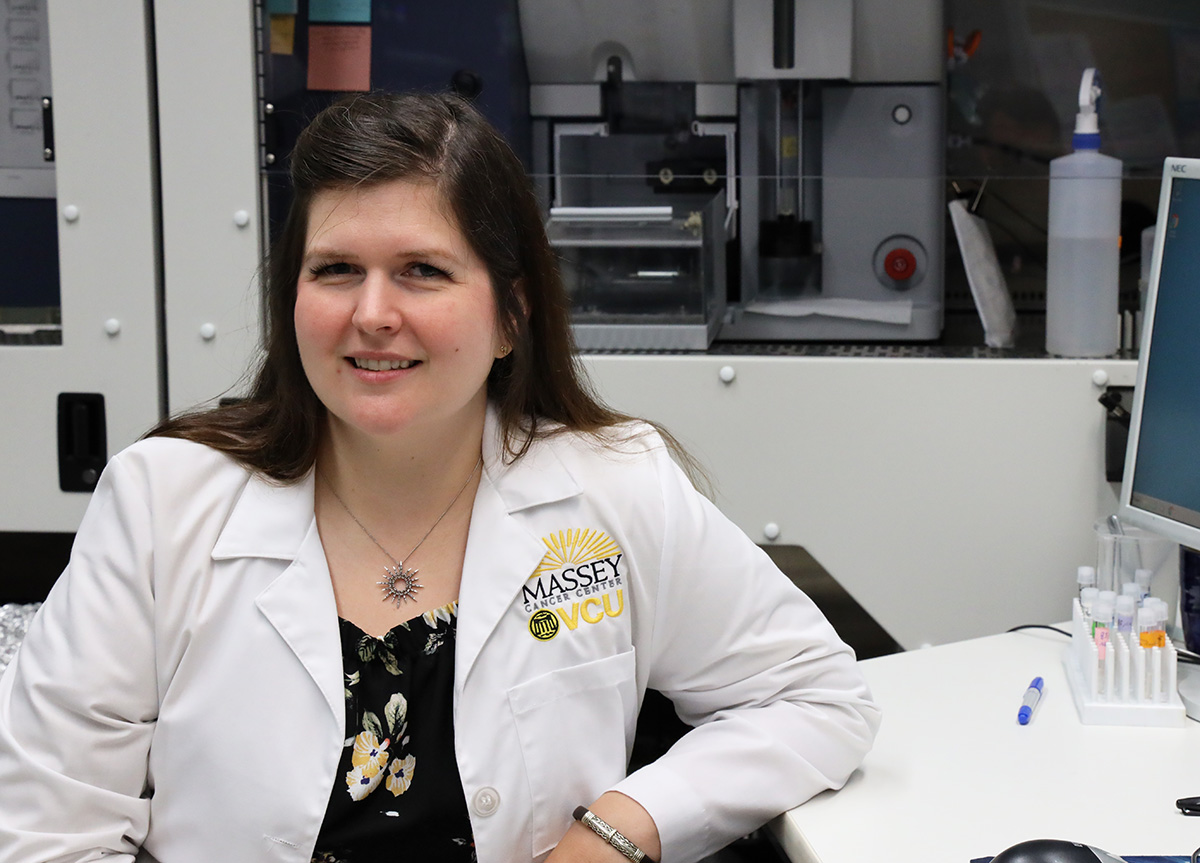Latest News
Research
Martin studies epigenetic modulators in breast cancer and guides researchers in tumor cell analysis
Sep 24, 2019

Rebecca Martin, Ph.D., is excited by a growing class of drugs called epigenetic modulators that could augment therapy for many cancer patients.
Epigenetic modulators are drugs that enhance the expression of proteins or antigens on the tumor that stimulates the immune system to kill it. Martin hopes to utilize these drugs in combination with the successful immunotherapeutic drugs called checkpoint inhibitors that can sometimes serve as an alternative to toxic chemotherapeutics for many cancer patients.
“With the widespread use of checkpoint inhibitors, we have seen that you can effectively harness the immune system to fight your own tumor, and it’s been really successful in the clinic,” Martin said. “This opens up a lot of avenues for promising research.”
Martin joined VCU Massey Cancer Center as a member of the Cancer Cell Signaling research program and the director of the Flow Cytometry Core Laboratory in 2018. She is also an assistant professor of microbiology and immunology at the VCU School of Medicine.
Martin’s studies are primarily centered on immunology, and she is currently collaborating with Massey physician-researcher Harry Bear, M.D., Ph.D., on a project that is looking at how drugs, a class of epigenetic modulators called DNA methyltransferase inhibitors, can increase a tumor’s ability to express antigens that can be identified and killed by immune cells. This research is being conducted in breast cancer cells but could have broad implications for other types of cancer. Based on this research, Bear has designed a clinical trial testing decitabine, in combination with a checkpoint inhibitor, in breast cancer patients.
As the director of Massey’s Flow Cytometry Core Laboratory, Martin guides researchers through a wide range of services related to cell sorting and analysis, from routine fluorescence analysis to interactive custom design of innovative analysis and sorting protocols that address the specific needs of individual investigators.
“Flow cytometry is an excellent tool for looking at the infiltrating cells in a tumor,” Martin said. “We have the ability to help scientists design panels and jumpstart their research if they feel like they’re not confident in flow cytometry.”
Additionally, Martin received an R56 from the National Institutes of Health’s National Institute of Allergy and Infectious Disease. Her other work focuses on allergic disease.
Martin grew up in Richmond. She earned a bachelor’s degree in biology and a Ph.D. in microbiology and immunology from VCU. Initially, Martin had envisioned that she would go to medical school until she enrolled in an undergraduate research program at VCU supported by the Howard Hughes Medical Institute.
“That summer program really changed everything in my life,” Martin said. “Instead of treating patients, I realized that I really wanted to answer the questions behind certain illnesses and understand the cellular origins of disease.”
During the completion of her Ph.D., Martin conducted federally funded research looking at myeloid-derived suppressor cells in cancer under the mentorship of Daniel H. Conrad, Ph.D.
“I credit him for instilling the scientific spirit within me, which had a huge impact on what I wanted to do with my career,” Martin said.
Martin completed her postdoctoral work at VCU in the Center for Health Disparities as an Institutional Research and Career Development Award (IRACDA) Fellow funded by a K award through the NIH. As a fellow in this program, her postdoctoral work combined a traditional mentored research experience with an opportunity to develop teaching skills through formal pedagogic training and mentored assignments at local historically black universities.
“I wanted to stay in academia, and I thought that this program would give me the skills that I needed,” Martin said. “I came away from this program with mentoring skills and teaching skills, much more prepared to start my own lab.”
Martin has published 17 articles in peer-reviewed journals, including Cell Reports and Mucosal Immunology. She has been a member of the American Association of Immunologists since 2013 and is the recent recipient of the VCU School of Medicine Departmental Teaching Award in Microbiology and Immunology.
Martin lives in Richmond with her husband, son and two daughters in the West End. They enjoy paddle boarding and kayaking at Robious Landing Park.
Written by: Blake Belden
Related News
Research
Robert A. Winn Clinical Investigator Pathway Program welcomes fourth cohort of medical student awardeesJul 8, 2025
Research
“We’re aiming for a cure.” Massey and VIMM researchers achieve potential breakthrough in brain cancer treatmentJun 24, 2025
Research
Massey researchers discover new genetic target that could shape the future of liver cancer treatmentJun 23, 2025

Get access to new, innovative care
Treatments in clinical trials may be more effective or have fewer side effects than the treatments that are currently available. With more than 200 studies for multiple types of cancers and cancer prevention, Massey supports a wide array of clinical trials.

Find a provider
Massey supports hundreds of top cancer specialists serving the needs of our patients. Massey’s medical team provides a wealth of expertise in cancer diagnosis, treatment, prevention and symptom management.
